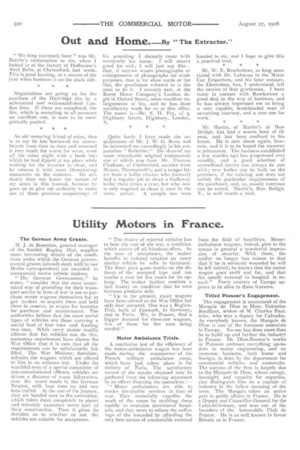Utility Motors in France.
Page 12

If you've noticed an error in this article please click here to report it so we can fix it.
The German Army Grants.
M. J. de Bosredon, general manager of the Societe Regina Dixi, supplies some interesting details of the conditions under which the German governmental grants (already dealt with by our Berlin correspondent) are awarded to commercial motor vehicle makers.
" The German Government," he states, " consider that the most economical way of providing foitheir transport service in time of war is not to purchase motor wagons themselves but to get traders to acquire them and hold them in reserve, in return for bounties for purchase and maintenance. The authorities believe that the most useful types of vehicles are those carrying a -useful load of four tons and hauling two tons. While every maker readily affirms that his vehicles can do this, numerous experiments have shown the War Office that it is rare that all the requirements can be satisfactorily fulfilled. The War Minister, therefore, submits the wagons which are offered to him to an arduous test. Under the watchful eyes of a special committee of non-commissioned officers, vehicles are driven a distance of 2,000 kilometres, over the worst roads in the German Empire, with four tons up and two tons trailed. At the end of the journey, they are handed over to the committee, which takes them completely to pieces and minutely examines every part of their construction. Then it gives its decision as to whether or not the vehicles are suitable for acceptance.
" The maker of rejected vehicles has to bear the cost of the test, a condition which staves off all frivolous offers. In the case of acceptance, the maker benefits by reduced taxation on every similar vehicle he sells in Germany. The State pays 4,000 marks on the delivery of the accepted type and zoo marks a year for live years for its upkeep. 'Mc maker further receives a fuel bounty an condition that he uses German products only.
" Up to the present, many wagons have been offered to the War Office but only four accepted. One was a ReginaDixi, built at Eisenach, in Germany, and in Paris. We, in France, find a bigger demand for three-ton wagons, few of those for five tons being needed."
Motor Ambulance Trials.
A conclusive test of the efficiency of the motor-ambulance wagon has been made during the manoeuvres of the French military ambulance corps, which have just taken place in the vicinity of Paris. The satisfactory nature of the results obtained may be gathered from the following statement by an officer directing the operations :— " Motor ambulances are able to render invaluable services in time of war. They materially expedite the work of the corps by enabling them rapidly to evacuate provisional hospitals, and they serve to relieve the sufferings of the wounded by affording the very best means of comfortable removal from the field of hostilities. Motorambulance wagons, indeed, give to the troops in general a wonderful impression of security. With them, the soldier no longer has reason to fear that if he is seriously wounded he will be left behind; he knows that the motor wagon goes swift and far, and that his speedy removal to hospital is ensurd." Every country of Europe appears to be alive to these features.
Titled Pioneer's Engagement.
The engagement is announced of the Marquis de Dion to Mme. Valentine Bouillant, widow of M. Charles Paulmier, who was a deputy for Calvados. As everybody knows, the Marquis de Dion is one of the foremost motorists in Europe. No one has done more than he to build up and further the industry in France. De Dion-Bouton's works at Puteaux embrace everything up-todate in motor engineering, and an immense business, both home and foreign, is done by the department for commercial vehicles and tnotorcabs. The success of the firm is largely due to the Marquis de Dion, whose energy, foresight, and capacity for organisation distinguish him as a captain of industry in the fullest meaning of the term. The Marquis takes an active part in public affairs in France. He is a Deputy and Councillor-General for the Loire-Inferieure, and was one of the founders of the Automobile Club de France. He is as well known in Great Britain as in France.




















